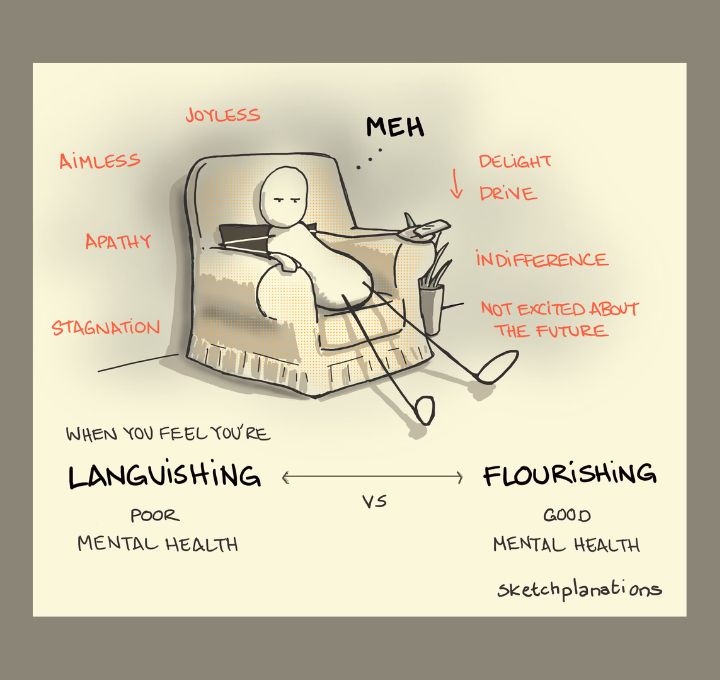Are you feeling “blah” or “meh”?
Maybe you feel like you are stuck in a rut. You’re not motivated or enthusiastic about much of anything these days.
You might be experiencing Languishing.
Languishing is a state of feeling stagnant, unproductive, and empty.
It feels as if you’re muddling through your days, looking at your life through a foggy windshield.
It’s a middle ground of grey where things are “fine.” Not great, but not terrible.
They just… are.
In my line of work, I see languishing as that space between burnout and depression.
You aren’t experiencing major depression symptoms, but you aren’t functioning well socially or psychologically.
You’re emotionally exhausted and your brain functions similarly to being overwhelmed by stress.
Learn to let go so you can stop languishing with my Letting Go Workbook.
What is Languishing?
The term languishing was coined by sociologist Dr. Corey Keyes.
Keyes describes languishing as an internal alarm clock that is going off. The alarm is warning us that something has been lost or has gone missing; we aren’t doing the things that make our life meaningful.
Many of us ignore these feelings until they just become a habit. This habit becomes destructive because we continue to not prioritize our mental health or emotional needs. We think there is something more important than our sense of purpose, our sense of belonging, or warm and trusting relationships.
The truth is: we need those things.
Languishing affects some of your decisions, behaviors and emotions towards yourself, others, and the world.
While languishing may make you wonder about the purpose of life, or of daily routines, strong emotions such as dread and fear are not present or persistent.
Could This Be What’s Ailing You?
People who are introverted, work in isolation, or not married are more prone to languishing. So even married extroverts can experience languishing if they work alone. (I do! And, I did!)
Environmental factors and social situations may also play an important role.
A former client once described experiencing languishing after she had let go of a toxic group of friends. They had helped her form an identity, fill her time, and give her a sense of purpose.
When she disconnected from this group, she described feeling isolated and a bit lost. She lacked a positive source of motivation because she was incentivized by her former friend group’s drama.
Signs you might be languishing:
- You feel stuck or stagnant
- You notice reduced productivity
- You feel a lack of purpose
- You feel “blah” or “meh” more often than not
- You feel detached from others
- You lack enthusiasm for the activities you once enjoyed
- You notice reduced creativity or problem-solving ability
- You feel decreased satisfaction or accomplishment in life
- You experience a general sense of emptiness
- You are persistently low in energy, not due to physical exertion
- You have difficulty feeling joy, even in typically happy situations
How to Bust Out of Your Rut
Research suggests that mindfulness-based approaches might be the most effective way to combat languishing.
Mindfulness is a moment-to-moment awareness of your thoughts and situation without judgement.
Here are three mindfully based approaches to try:
- Get out of your head and into flow: Didn’t I just say to practice mindfulness? Well, part of mindfulness is knowing when it’s time to get out of your own head so you can move forward.
Getting in the flow gets you out of your head because you are focusing on something external. Flow is that feeling of being so caught up in an activity that you lose track of time and place.
To find your flow, it helps to:
- Set boundaries – Protect your time and energy so that you don’t get distracted and you can focus. Turn on the do not disturb feature on your phone, block off time on your calendar that is a non-negotiable so you can think.
- Set up small wins – Break larger tasks into smaller ones so that you get that sense of accomplishment faster.
- Let go of thoughts, judgements – Get rid of that little voice that is telling you “should be” doing this or that, or doing more. These negative thoughts are only killing your confidence, as well as, your focus.
- Connect with others – If you work from home or solo, you have limited social interaction. Heck, if you have a busy life with kids, work, and other commitments, you may also allow your social life to go by the wayside. Make an effort to connect with others.
Take feeling disconnected seriously and make it a point to connect offline. We need direct human contact. So many things are lost to interpretation when we rely on texting or email.
Also focusing on the quality of your friendships, rather than the quantity, will help you feel like you are making meaningful connections that are more satisfying.
- Set Goals or Set New Goals – It’s hard to feel motivated when you aren’t working toward anything, or you aren’t working toward something that motivates or interests you. Having something you can strive toward can help give you a sense of purpose.
Make it a point to learn something new, so you feel like you are continuing to grow. This will help fight that feeling that you are stuck or not doing something with purpose.
And, start to include leisure activities and time in your schedule. Leisure time allows you to rest your body and brain, while actively doing something that fulfills you. For example, instead of watching golf on TV, go find a course and play.
- Let Go of the Past – Many who languish find themselves ruminating on past mistakes and failures. It’s okay to think about what you’ve done in the past if you can feel yourself learning from it, and changing what you are doing in the present.
But if you’re not learning – Let. It. Go. Your decision to not let go is only holding you back.






